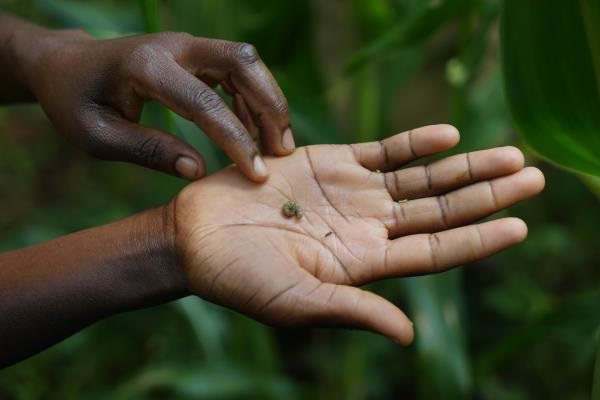FAO helps Kenyan farmers rescue harvest from Fall Armyworm
22 June 2018, Embu, KENYA - ‘With a good harvest, we have enough maize for ourselves, and then some to sell. But right now we have to buy the maize to feed the family,' says Agnes Waithira Muli, a smallholder farmer in Embu county in central Kenya. She and her husband lost most of their last crop due to Fall Armyworm (FAW), a potentially devastating insect pest that has spread across much of Africa.
Thanks to FAO training in Fall Armyworm control, however, they are better able to protect their current crop. "Now that we know how to deal with the infestation, our losses will be smaller," Agnes says.
Fall Armyworm is native to tropical and subtropical regions of the Americas, but has spread rapidly across Africa since 2016, causing serious damage particularly to maize crops.
In Embu county, the pest first appeared two seasons ago. As in so many other places, farmers soon realized, in despair, that pesticides did little to fight it.
Mechanical control
During the 2017 short rains season, FAO initiated a pilot project where specially trained ‘field scouts' were deployed to visit smallholder farmers and assist them in manual FAW control, twice a week for six weeks. The method used was mechanical control - identifying the eggs and larvae and then destroying them by hand.
Agnes and her husband, Robert Nurithi Nthiga, became part of this initiative. As a result, they did better than many of their neighbors - those who did no mechanical control often lost much of their crop to Fall Armyworm.
The couple have one acre of land, but it is divided into several plots. "We were only able to do the control on a quarter of the land, where we got four 90 kilo bags of maize. Without the Fall Armyworm, we could have harvested from the whole area, and got at least 15 bags," Agnes says.
These days, without the support of a scout, she and her husband inspect their plots for the insect as often as twice a day.
"It's a lot more work than before, but checking on the crop is a farmer's job," she says. The mother of three children, the youngest less than a year old, Agnes is busier than ever before.
‘A big difference'
Petronila Wanjira Njeru is the FAO-trained field scout who worked with Agnes and her husband to do the mechanical control. She says that there was some skepticism about the method among farmers in the beginning.
"But they became positive because they saw that pesticides did not work; manually eliminating the eggs and worms was the only solution," she says.
Herself a farmer, Petronila says she lost three quarters of her harvest last season to Fall Armyworm. But she, too, expects the coming harvest to be better. "This time, we will lose maybe one eighth of the crop. So the mechanical control is making a big difference," she says.
Meanwhile, Petronila also benefits from the salary she made as a field scout. It enabled her to buy 27 chickens, and with the money she made from them, she bought a dairy cow.
"Now we have milk for the family. And later in the year, there will be a calf, and we can produce milk to sell, too. Besides, the cow and chicken produce manure that we use for the farm, so we don't have to buy fertilizer anymore."
Effective for smallholders
Salesio Mugo Nyaga is another Embu smallholder farmer who learnt mechanical control from an FAO field scout. He has a small plot of land, a quarter of an acre, from which he harvested two 90 kilo bags of maize last season.
"We started the mechanical control a little late, and so I lost some. With no Fall Armyworm, maybe I would have had three bags," Salesio says.
Once familiar with the method, he has been able to practice mechanical control from the start of the season on his current crop. Three days a week he goes scouting, collecting and destroying caterpillars.
For some other farmers, it is not as easy. "It's a challenge for those who don't live close to their farms. And then there's the labour that goes into it," Salesio says. "But my neighbors who did no mechanical control lost everything."
